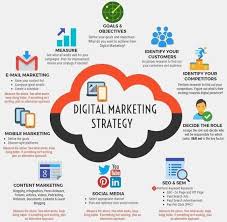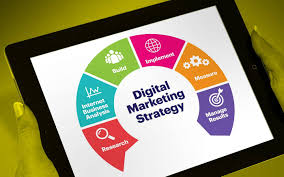How to Structure a Digital Marketing Strategy
In today’s digital age, having a well-defined digital marketing strategy is essential for businesses to succeed online. A structured approach not only helps in reaching the target audience effectively but also maximises the return on investment. Here are key steps to consider when structuring a digital marketing strategy:
Set Clear Objectives
Start by defining your goals and objectives. Whether it’s increasing brand awareness, driving website traffic, generating leads, or boosting sales, setting clear and measurable objectives will guide your digital marketing efforts in the right direction.
Know Your Target Audience
Understanding your target audience is crucial for crafting relevant and engaging content. Conduct market research to identify the demographics, preferences, and behaviours of your audience. This information will help you tailor your messaging to resonate with potential customers.
Choose the Right Channels
Selecting the appropriate digital channels is vital for reaching your target audience effectively. Consider using a mix of channels such as social media, search engine optimisation (SEO), email marketing, content marketing, and pay-per-click (PPC) advertising based on where your audience is most active.
Develop Compelling Content
Create high-quality and engaging content that adds value to your target audience. Whether it’s blog posts, videos, infographics, or social media posts, compelling content can help build brand credibility and drive user engagement across different digital platforms.
Implement SEO Strategies
Optimise your website for search engines to improve its visibility in search results. Conduct keyword research, optimise meta tags and descriptions, create quality backlinks, and regularly update your content to enhance your site’s SEO performance.
Monitor and Analyse Performance
Track key performance indicators (KPIs) such as website traffic, conversion rates, click-through rates, and social media engagement to evaluate the effectiveness of your digital marketing strategy. Use analytics tools to gain insights into user behaviour and make data-driven decisions for continuous improvement.
Adapt and Evolve
Digital marketing trends evolve rapidly, so it’s essential to stay agile and adapt to changes in the online landscape. Regularly review and refine your strategy based on performance data, industry trends, and feedback from customers to ensure ongoing success.
By following these steps and maintaining a strategic approach to digital marketing, businesses can create impactful campaigns that resonate with their target audience and drive sustainable growth in the competitive online marketplace.
7 Key Elements for Structuring an Effective Digital Marketing Strategy
- Setting clear objectives helps in defining measurable goals for the digital marketing strategy.
- Understanding the target audience enables tailored messaging that resonates with potential customers.
- Choosing the right channels ensures effective reach to the target audience across various digital platforms.
- Compelling content creation enhances brand credibility and drives user engagement online.
- Implementing SEO strategies improves website visibility and increases organic traffic from search engines.
- Monitoring performance through KPIs provides valuable insights for data-driven decision-making and continuous improvement.
- Adapting and evolving the strategy based on trends and feedback ensures relevance and competitiveness in the digital landscape.
Navigating the Challenges of Crafting a Digital Marketing Strategy: Complexity, Resources, and Change
Setting clear objectives helps in defining measurable goals for the digital marketing strategy.
Setting clear objectives is a crucial step in structuring a digital marketing strategy as it allows businesses to define specific and measurable goals. By establishing clear objectives, companies can create a roadmap for their digital marketing efforts, outlining what they aim to achieve and how success will be measured. This clarity not only provides focus and direction but also enables businesses to track their progress effectively and make informed decisions based on measurable outcomes. Ultimately, setting clear objectives helps in aligning the digital marketing strategy with the overall business goals, leading to more targeted and successful campaigns.
Understanding the target audience enables tailored messaging that resonates with potential customers.
Understanding the target audience is a crucial aspect of structuring a digital marketing strategy as it allows businesses to tailor their messaging in a way that resonates with potential customers. By gaining insights into the demographics, preferences, and behaviours of the target audience, businesses can create personalised and relevant content that effectively engages and connects with their customers. This tailored approach not only enhances the overall user experience but also increases the likelihood of driving conversions and building long-lasting relationships with customers.
Choosing the right channels ensures effective reach to the target audience across various digital platforms.
Selecting the appropriate digital channels is a crucial aspect of structuring a digital marketing strategy. By choosing the right channels, businesses can ensure effective reach to their target audience across a diverse range of digital platforms. Whether it’s leveraging social media for engagement, utilising SEO for increased visibility, or implementing email marketing for direct communication, selecting the most suitable channels enables businesses to connect with their audience in meaningful ways and maximise the impact of their digital marketing efforts.
Compelling content creation enhances brand credibility and drives user engagement online.
Creating compelling content is a fundamental aspect of structuring a successful digital marketing strategy. By producing high-quality and relevant content, businesses can not only establish themselves as industry authorities but also build trust and credibility with their target audience. Engaging content has the power to captivate users, encourage interaction, and foster meaningful relationships online. This strategic approach not only enhances brand visibility but also drives user engagement, ultimately leading to increased brand loyalty and conversions in the digital landscape.
Implementing SEO strategies improves website visibility and increases organic traffic from search engines.
By implementing SEO strategies as part of a structured digital marketing strategy, businesses can significantly enhance their website visibility and attract a higher volume of organic traffic from search engines. Optimising website content with relevant keywords, improving meta tags and descriptions, and building quality backlinks not only boost search engine rankings but also make it easier for potential customers to discover the website through organic search results. This increased visibility not only drives more qualified traffic to the site but also establishes a strong online presence that can lead to long-term success in the digital landscape.
Monitoring performance through KPIs provides valuable insights for data-driven decision-making and continuous improvement.
Monitoring performance through Key Performance Indicators (KPIs) is a crucial aspect of structuring a digital marketing strategy. By tracking and analysing KPIs, businesses can gain valuable insights into the effectiveness of their marketing efforts, enabling data-driven decision-making and continuous improvement. Understanding which strategies are performing well and which areas need adjustment allows for targeted refinements that can optimise results and drive success in the ever-evolving digital landscape. This proactive approach to monitoring performance through KPIs empowers businesses to make informed decisions that lead to enhanced performance and sustainable growth.
Adapting and evolving the strategy based on trends and feedback ensures relevance and competitiveness in the digital landscape.
Adapting and evolving a digital marketing strategy based on trends and feedback is crucial for maintaining relevance and competitiveness in the ever-changing digital landscape. By staying attuned to industry developments, consumer preferences, and emerging technologies, businesses can adjust their strategies to meet the evolving needs of their target audience. Incorporating feedback from customers and analysing performance metrics allows for continuous improvement and ensures that marketing efforts remain effective and aligned with current market trends. This proactive approach not only enhances brand visibility but also positions businesses for long-term success in the dynamic digital environment.
Overwhelming Complexity
Navigating the overwhelming complexity of structuring a digital marketing strategy can pose a significant challenge for businesses. With a multitude of channels, tools, and tactics to choose from, determining the most effective strategies can be daunting. The sheer volume of options available in the digital landscape may lead to decision paralysis and hinder the ability to focus on the most impactful approaches. Finding ways to streamline and simplify the process while still harnessing the power of diverse digital marketing avenues is essential for businesses looking to overcome this con and achieve success in their online endeavours.
Resource Intensive
One notable drawback of structuring a digital marketing strategy is its resource-intensive nature. Developing and implementing a well-defined strategy demands considerable time, effort, and resources. This can pose a challenge for small businesses or startups operating on limited budgets, as they may find it difficult to allocate the necessary resources for comprehensive digital marketing initiatives. The lack of resources can hinder their ability to compete effectively in the online space and reach their target audience with impactful campaigns.
Rapidly Changing Landscape
In the rapidly changing landscape of digital marketing, businesses face the challenge of staying abreast of the latest technologies, trends, and algorithms that shape online strategies. With new developments emerging regularly, it can be daunting for businesses to adapt quickly and effectively. This dynamic environment requires continuous monitoring and a proactive approach to ensure that marketing strategies remain relevant and competitive in an ever-evolving digital space.





